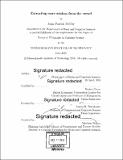Extracting more wisdom from the crowd
Author(s)
McCoy, John Patrick
DownloadFull printable version (12.37Mb)
Other Contributors
Massachusetts Institute of Technology. Department of Brain and Cognitive Sciences.
Advisor
Dražen Prelec and Joshua B. Tenenbaum.
Terms of use
Metadata
Show full item recordAbstract
In many situations, from economists predicting unemployment rates to chemists estimating fuel safety, individuals have differing opinions or predictions. We consider the wisdom-of-the-crowd problem of aggregating the judgments of multiple individuals on a single question, when no outside information about their competence is available. Many standard methods select the most popular answer, after correcting for variations in confidence. Using a formal model, we prove that any such method can fail even if based on perfect Bayesian estimates of individual confidence, or, more generally, on Bayesian posterior probabilities. Our model suggests a new method for aggregating opinions: select the answer that is more popular than people predict. We derive theoretical conditions under which this new method is guaranteed to work, and generalize it to questions with more than two possible answers. We conduct empirical tests in which respondents are asked for both their own answer to some question and their prediction about the distribution of answers given by other people, and show that our new method outperforms majority and confidence-weighted voting in a range of domains including geography and trivia questions, laypeople and professionals judging art prices, and dermatologists evaluating skin lesions. We develop and evaluate a probabilistic generative model for crowd wisdom, including applying it across questions to determine individual respondent expertise and comparing it to various Bayesian hierarchical models. We extend our new crowd wisdom method to operate on domains where the answer space is unknown in advance, by having respondents predict the most common answers given by others, and discuss performance on a cognitive reflection test as a case study of this extension.
Description
Thesis: Ph. D., Massachusetts Institute of Technology, Department of Brain and Cognitive Sciences, 2018. Cataloged from PDF version of thesis. Includes bibliographical references (pages 129-140).
Date issued
2018Department
Massachusetts Institute of Technology. Department of Brain and Cognitive SciencesPublisher
Massachusetts Institute of Technology
Keywords
Brain and Cognitive Sciences.